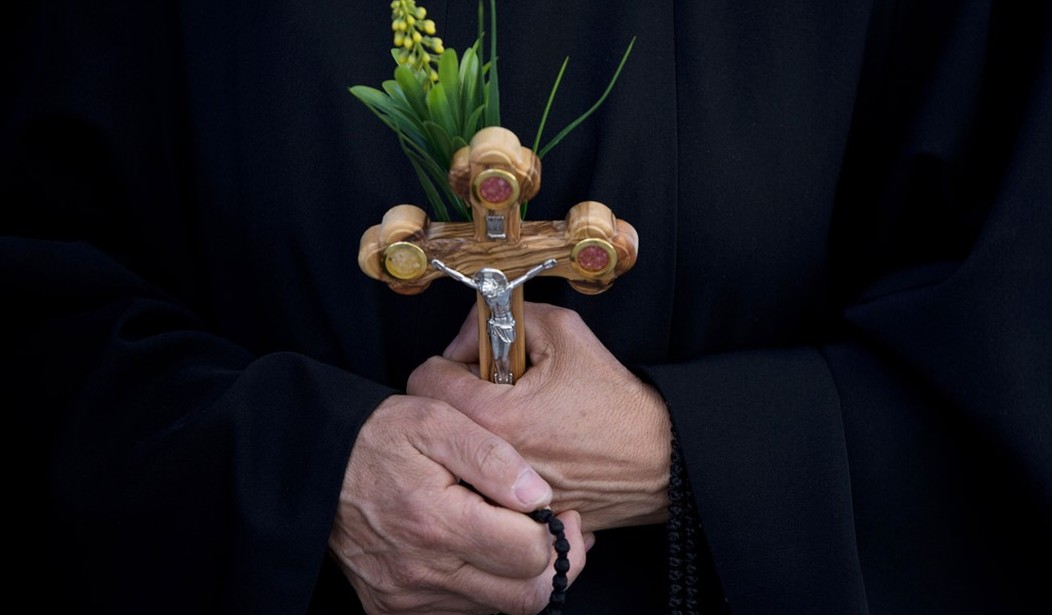What makes this Friday good?
On Good Friday, Christians make the extraordinary claim that God Himself, having taken flesh and become man, endured torture and was ultimately nailed to a cross, where after three hours, He “uttered a loud cry, and breathed his last” (Mark 15:37).
So what's good about it?
Throughout the ages, Christians of all traditions have explained that this happened, and that this Friday is good, because Jesus Christ was on the cross to bear the sins of the world, and because with His resurrection, He conquered death and opened the way to eternal life.
Yet throughout history, some Christians have singled out the Jews, levying upon them nothing less than the charge of deicide. As “Antisemitism: History and Myth” shows, this became the central and most enduring Christian indictment of the Jews, and the basis for countless pogroms throughout history.
Yet of all the charges that haters of the Jews levy against them, this core allegation is one of the strangest, weakest, and most curious of all.
Those who make this claim have their favorite scripture passages. Pontius Pilate, the Roman procurator of Judea, is depicted in the Gospel according to Matthew as facing the Jewish mob that is demanding the execution of Jesus and washing his hands, saying: “I am innocent of this man’s blood; see to it yourselves.” The crowd cries out in response: “His blood be on us and on our children!” (Matthew 27:24)
It was largely on the basis of this passage, as well as one in which Paul says that “the Jews… killed both the Lord Jesus and the prophets” (I Thessalonians 2:15), that the charge began that the Jews in the aggregate, or at least those who had rejected the claim that Jesus was the Messiah, were nothing less than murderers, and not just murderers of the Messiah, but in view of the divinity of Christ, murderers of God himself.
Yet it is basic Christian theology that the death of Christ was the result of the sins of all mankind, not one particular group. The apostle Peter says: “He himself bore our sins in his body on the tree, that we might die to sin and live to righteousness” (I Peter 2:24). Christ’s death was sacrificial, as He bore the weight of all human sin on the cross. Because of that, and in light of his resurrection, His crucifixion is not the tragedy that it would have been if He had been just an ordinary human being. It is, rather, the basis for the redemption of the world. Every human being who lives now and has ever lived, from this perspective, can say that he or she is responsible for the crucifixion of Christ, for were it not for human sin, there would have been no warrant for his incarnation and sacrifice.
In light of that, however, it is extremely strange to single out one group of people, the Jews, as responsible for his death, or more responsible than any other group. If the Jews killed Christ, and that was an act of supreme criminality, then how can it simultaneously be affirmed that he died as the result of the sins of all people, and in order to renew and redeem them? The Roman Catholic mass for Holy Saturday contains the exclamation: “O happy fault, O necessary sin of Adam, which gained for us so great a Redeemer!”
Yet all too many who have prayed these words or heard them sung on Holy Saturday throughout history have gone out and behaved toward Jews they encountered as if it were anything but a “happy fault” and a “necessary sin,” and that their own sins had nothing whatsoever to do with it.
The passage in Matthew does depict the Jews who are calling for the crucifixion of Christ as saying “His blood be on us and on our children,” and this epitomizes the strangeness of the charge of deicide. This passage has been interpreted as meaning that the Jews bear a unique responsibility for the death of Christ, and that this responsibility extends not just to those who were present when Jesus was condemned to death and crucified, but to all Jews thereafter, the children of those who betrayed their own redeemer.
Yet at the same time, the last book of the New Testament, the Revelation to John, depicts those redeemed in Christ as wearing white robes. “One of the elders” explains to John: “These are they who have come out of the great tribulation; they have washed their robes and made them white in the blood of the Lamb” (Revelation 7:13-14). John refers to Christ as the one “who loves us and has freed us from our sins by his blood” (Revelation 1:5).
Related: Islamization: Another 'Conspiracy Theory' Turns Out to Have Been True All Along
The same apostle John says that “the blood of Jesus His Son cleanses us from all sin” (I John 1:7). The letter to the Hebrews, which was traditionally attributed to Paul, says that “the blood of Christ” will “purify your conscience from dead works to serve the living God” (Hebrews 9:22). If one is to demand consistency, then, to say “His blood be on us and on our children” is to say that one is particularly blessed and redeemed. Yet for centuries, the phrase was instead primarily understood as the Jews incriminating themselves.
And even today, we see the new antisemites repeating this ancient charge, and haughtily proclaiming that “Christ Is King.” If they really believed that, they would know that they are the ones, not the Jews, who put Him on the cross. They are, and you are, and I am. This is the last grounds in the world on which anyone should proudly point the finger of blame at anyone else.
The struggle against the left is one of light and truth against darkness and lies. Become a PJ Media VIP member, and you'll get all we have to offer, with no interference from ads. You'll also get 60% off if you use the promo code FIGHT!










Join the conversation as a VIP Member